Wegmans Food Markets: Homespun Sustainability
May 14, 2013 | 18 min to read


Like Amish quilters, Wegmans sews its sustainability tradition into its visionary fabric.
Sustainability at Wegmans, a 79-store family chain rooted in Rochester, NY, revels in palpable contrasts analogous to the making of an Amish quilt. One only needs to study a micro and macro image of a traditional quilt. First, zoom in on the exceptionally skilled craft, precision stitching and attention to complicated pattern detail. These quilters, like the Wegmans family and their long-tenured employees and grower partners, accomplish this dedicated hard work through humble traditions, homespun values, and organic collaboration, always staying true to their core.
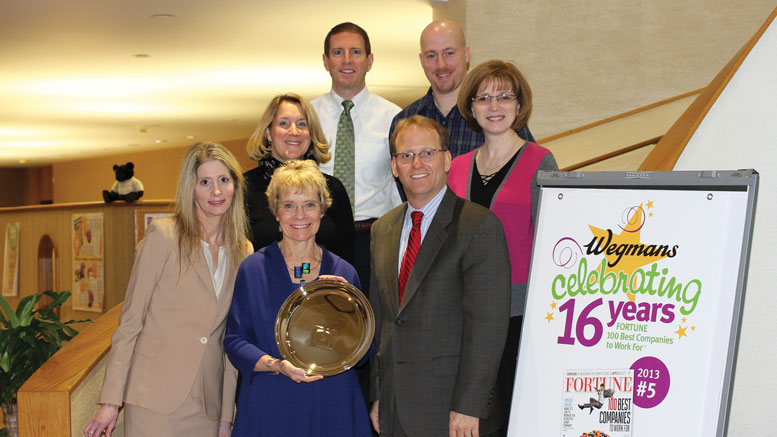

Then, zoom out to reveal the entire quilt, an unexpectedly modern, provocative and innovative masterpiece; it could be an iconic sunrise design jettisoning toward the edges, a strikingly contemporary, three-dimensional building block design, or a bold, colorful geometric, shockingly preempting the dynamic 20th century art movement.
The art of Wegmans sustainability model layers realistic, internal, high-impact, cost-saving results with visionary resourcefulness and smart experimentation and discovery. The workplace culture breeds a legacy of rich, colorful stories highlighting its values, which resonate daily in clear, consistent sustain-ability messaging throughout the close-knit community.
Since its 1916 beginnings, Wegmans has emanated steadfast willingness to pave its own path, whether going against convention to sell irradiated beef to its customers when no other retailers dared, or taking on the complexities of its own organic farm to build a northeast organic produce supplier base.
NO NONSENSE SUSTAINABILITY
Wegmans down-to-earth inclusiveness brings with it an imperative to share among other retailers and the broader food community its learnings from food safety to energy efficiencies to optimization of produce waste. Wegmans also is keen on dispelling sustainability myths and superficial fads to enact and encourage meaningful sustainable solutions for the long term.
Beyond the rhetoric, whats the payoff? asks Jason Wadsworth, sustainability coordinator, whose history as a fourth generation poultry farmer invariably links back to Wegmans entrepreneurial spirit and tenacity at the heart of its sustainability measures. In 1967, retail pioneer Bob Wegman appointed Wadsworths grandfather general product manager to run Wegmans first egg farm, and from there the family relationship was sealed.
However, it wasnt until 2007 that Wegmans decided to create a full-time sustainability position and formulate an official, corporate sustainability platform, which is now headed up by Wadsworth and overseen by Mary Ellen Burris, senior vice president, consumer affairs.
Its easy to get inspirational about sustainability with all the feedback from our customers and watching the trends, says Burris, but I resisted a full-fledged, formal corporate sustainability plan for a while.
Burris, who kicked off Wegmans first environmental wave in the late 1980s, explains the hesitation of diving back in to champion a full blown program: I was around in the 1980s when the environment was a hot topic, with Love Canal and the toxic garbage barge, and the catchy slogans, give a hoot, dont pollute; reduce, reuse, recycle, establishment of Earth Day, etc., but somehow sustainability didnt seem to have the staying power. Fire crackers went up and fizzled.
Jeanne Colleluori, communications and media specialist, describes the turning point: Around 2005 and 2006, the ideas resurfaced, this time with the name sustainability, connecting how carbon footprints affected people and the financial aspects, and what things must fall together for truly sustainable outcomes. Now we were looking at a complete and lasting legacy.
I remember the onslaught of sustainability and my epiphany, Burris continues. I thought of what Jason Wadsworth could do, and how we needed to implement a company-wide sustainability strategy and recoup sustainability within of our organization.
Wegmans sustainability program extends throughout all aspects of the corporation, now some 44,000 employees strong. It starts with our leadership and a commitment to work on sustainability, corporate-led initiatives department by department, says Wadsworth. The other side is the grassroots effort, creating Green Teams at the store level, employees generating ideas.
Wadsworth describes his role as one of guiding the hotspots, whats coming down the road that we should be working on, the priorities around sustainability, and then its up to folks in each department to figure out what they can do to affect the most change. Then we work together tracking progress and communicating internally.
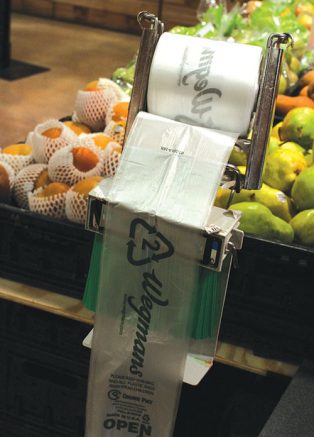

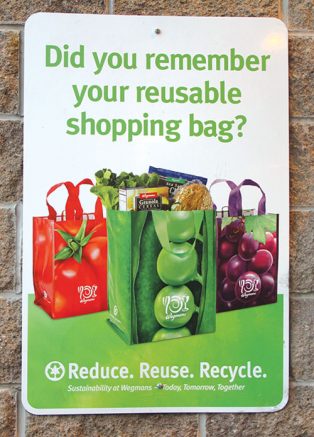

Plastic bags, with 40 percent recycled content, and reusable cloth bags are sustainable options for consumers to choose
FROM WITHIN ITS FOUR WALLS
Three things shape Wegmans sustain-ability focus: carbon footprint reduction, packaging/recycling and products that help customers make a difference, according to Wadsworth. We picked these priorities by including customer input to determine where the largest environmental impacts were within our four walls. We found the largest environmental impacts also had the largest costs.
We very much look at the economics as part of our sustainability platform, says Wadsworth. We have to move a business and if things are not economically feasible, how long can they truly be sustained? We firmly believe that.
In 2007, Wegmans new sustainability team set out to apply all the good things the company had done in the past and set the framework for future endeavors. We thought that reduce, reuse, recycle mentality was pretty spot on, says Wadsworth. The underlying sentiment, according to Wadsworth: Youre not going to save the world, but you can construct little changes along the way that will make a real difference.
The retail sustainability community is tight-knit because its small, says Wadsworth. One of our first decisions as an industry task force was that sustainability should not be a competitive topic because its the right thing to do, and with that spirit we share information and encourage other retailers to jump on board and follow along.
Wegmans wants to ensure that investments and resources are not futilely misdirected within the company or externally by its customers. A critical goal is to forge a green path that leads to impactful results, and that also means setting the record straight for consumers on sustainable alternatives, according to Wadsworth, who devotes significant space on Wegmans website clearing up consumer misconceptions and differentiating between the folklore and the facts.
Wadsworth sheds light on the most popularly held beliefs about carbon footprints, recycling and biodegradability, and he provides action-oriented steps so consumers can make informed sustainability choices. Mary Ellen Burris blogs every week, and we also have a lot of other people throughout the company who we ask to blog about their area of expertise, so you often find talk about new products or other sustainability initiatives, adds Colleluori.
If we find something sustainable that is either cost-neutral or even if its marginally a little bit higher, but we still need to do the right thing, well try to bring that in, says Bill Guido, category merchant packaging and supplies. On the packaging side, we try to find things either upstream or downstream that can be recycled or contain less plastic. For example, our food containers now have 40 percent less plastic going into them. We switched from polystyrene containers, which were not sustainable at all, and also a little more costly.
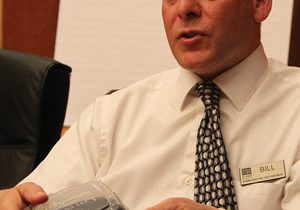

In this case, customers instigated the change, according to Wadsworth, who notes that Wegmans fields up to 1,400 consumer communications a week. What customers say within the sustainability area is fragmented, but we listen very closely. In fact, the move to get rid of Styrofoam came because our customers said, We dont want Styrofoam.
Yet, customers dont always know the whole story. Styrofoam gets maligned, but it is not necessarily bad; its just not recyclable, explains Wadsworth. So our mission is to get more recyclable containers so the customers can do the right thing with them.
ROCK, PAPER, SCISSORS AND OTHER QUANDRIES
Similarly, the merits of using paper bags, plastic bags, or reusable bags depend on a variety of factors, and the choice is not so obvious. A lot of customers dont like plastic bags and would prefer paper as they feel paper is more sustainable, says Guido. We now have a plastic bag that is 40 percent recycled content, but it took us a while to get there because we wanted the bag to be strong. Its pretty important that customers groceries are intact. If you decrease strength or weight of a package so much that the bag fails, youve increased customer frustration, whether its in our parking lot or home on their garage floor, and product is ruined, food is wasted, so youve just gone backwards.
As Colleluori puts it: Obviously, we are a retailer and were in business to sell product, so thats the focus of the rest of the company. Now with that said, we go into select products with that mentality. We work with the best suppliers to make improvements.
These more sustainable plastic bags are part of Wegmans closed loop, bag-to-bag program now, where Wegmans collects plastic bags at the store level from customers, and the bags get trucked down to its manufacturer in Houston, TX, which turns them back into resin and creates a percentage of the bags containing materials from the old plastic bags.
Further, we actually reduced the size of the bag from 24 inches to 22 inches, which amounts to a savings of about 19 tractor trailer loads less per year of plastic bags, says Guido. That two-inch difference doesnt sound like a significant amount, but it adds up when you look at such large quantities. We also eliminated the tie on it since we found most cashiers were just looping the bags anyway.
We often hear the argument that paper is more sustainable and that its better for the environment than plastic, says Wadsworth, and I guess it depends on what the end of a plastic bags life is or what the end of a paper bags life is. If youre going to throw the plastic bag out of the window of your car, it has a bad end life compared to doing the same with a paper bag. If you recycle both of them, the plastic has a better end of life just because of the resources you use, he continues. Its lighter and it takes seven tractor trailer loads to ship the same amount per bag of paper than it does plastic.
Further, Most people think that plastic bags are made from oil. And theyre actually made from polyethylene, which is made from natural gas. So its still a fossil fuel gas, but were not shipping oil across long distances in containers to make plastic bags in the country. People say were wasting so much oil, but natural gas is produced in America, says Wadsworth, adding, Still, theres a finite life of how many times you can recycle.
Other quandaries must be considered, as in the sale of reusable cloth bags. Were procuring a reusable bag from China, because we had to keep the price low to get people to embrace its use. Its harder to create a habit when youre paying more for a bag, so thats why 99 cents is what we sell ours for, Wadsworth informs. But the issue is, if people are not reusing those bags, then actually, that bag has a worst imprint than a traditional plastic bag, he points out.
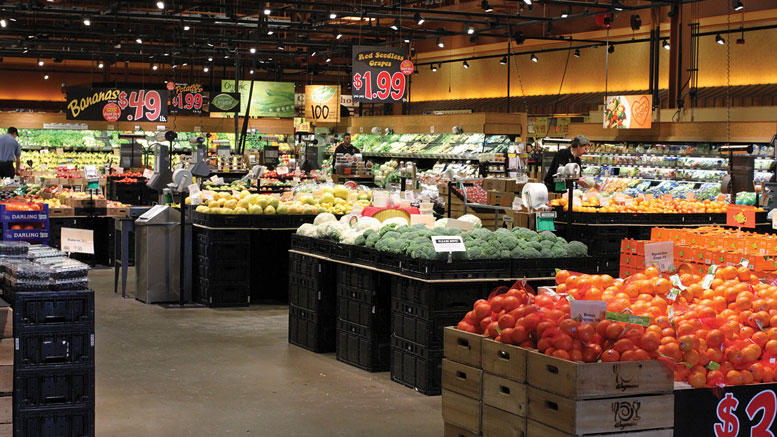

We encourage people to choose reusable cloth bags with signage and other communication a out, but its a struggle because people are creatures of habit, says Colleluori, adding, Im a diehard reusable bag user, and many times when cashiers get to my packages of chicken or beef, they will frequently ask, Would you like me to put this in plastic? but theyre addressing an issue of potential cross-contamination. In the end, going green is a well intentioned balancing act.
TO LEED OR NOT TO LEED
We dont believe in going after LEED (Leadership in Energy and Environmental Design) certification to shout about it, says Wadsworth, noting companies that do big media events to unveil the shiny plaque from the U.S. Green Building Council (USGBC). On energy efficiency, it makes all the sense in the world from a LEED-certified standpoint, but there are other elements like rainwater collection, green space and social aspects, where going through the LEED process may not pay off. Why build bike racks and showers for employees who work in locations where they have to drive? he asks, adding, We hone in on whats important and do a gut check, looking at different certifications on a case-by-case basis.
For instance, Green Globes, an environmental assessment and ratings system, which originated in Canada and is operated in the United States by the Green Building Initiative in Portland, OR, is a better fit for retailers, according to Wadsworth. The meat of what were trying to do is reduce our carbon foot-print, and wed rather spend our money there. Green Globes understands retail construction more, he says, noting, There is a pretty substantial cost to do a certification. If were already doing most of these practices, why spend the money to get a plaque? Whats fair to say, we would comply with any municipality that requires them, but if the certification doesnt meet our bottom line, reduce our carbon footprint, and make sense for our employees and our business, we wont do it, says Wadsworth.
FLOOR-TO-CEILING SUSTAINABILITY
First and foremost, Wegmans celebrates its reputation as a premier fresh foods aficionado and merchandiser, with the produce department a cornerstone, so any sustainability measures from flooring to lighting systems to refrigerant management can only proceed with that in mind. Wegmans teams technology experts with retail floor executives to strategize compatible solutions.
It was a big changeover going to green floor care, says Guido. During the summer months, we use ionized water and basically thats all we use to clean the floor. When youre done with the chemical, youre leaving a residue, so weve found things stay cleaner longer. Its electronically charged water, which duplicates the chemistry of chemical cleaners, where the chemical puts a positive and negative charge on the water to attract the dirt, Wadsworth explains.
We thought we had a perfect solution, 100 percent chemical-free, but in the winter with snow, you use a lot of salt if youre in the north-east its back to neutral cleaners to help break that salt down. Even so, we still reduce our chemical usage by half, says Guido. While in the new stores, floors are concrete, but some stores, where we have tile, present challenging floor situations. We are looking for long-term floor care products and try different things, says Guido, quick to point out, but our very first order of business is to make sure its going to do that primary function.
A sweeping chainwide lighting retrofit and newly designed lighting systems for stores have dramatically slashed energy usage, while cleverly enhancing produce displays to better highlight products and the overall shopping atmosphere, according to Carol Duquette, vice president development group, design services and maintenance. The payback on retrofitting LED spotlights in all our existing stores, with LED lasting seven to eight years, amounts to a 70 percent reduction in energy, she says.
On new stores, we did two things: reduced the amount of light fixtures in stores roughly in half from six years ago to now so that in itself is a savings, and I believe all the lighting in stores is now considered to be high efficiency, she says, adding, weve also gotten rid of halogens.
At Wegmans, where proper lighting plays an integral role in merchandising and the customer shopping experience, messing around with the lighting fixtures can create quite a stir with produce managers and merchandisers, according to Frank Auria, project manager, who describes his role as more of a grassroots, boots-on-the-ground approach to energy, where Carol Duquettes group focuses on the design side and larger scale picture.
Tackling sales floor lighting was the most difficult piece, says Auria. When youre on a sales floor in a retail store, the look and feel is the most important thing. Obviously, there are going to be a lot of passionate people as far as changing lighting systems.
Lighting alternatives that maximize efficiencies can be counterproductive to showing off fresh fruits and vegetables in their most appealing ways. To get a clearer under-standing from a produce department perspective, We basically set up a program where we looked at each store; the guidelines on number of lights per foot, where and how people were directing spotlights and the effects they were hoping to achieve, according to Wadsworth.
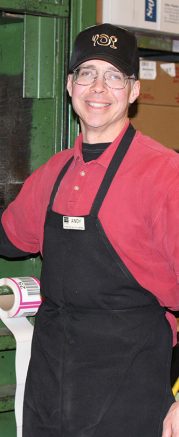

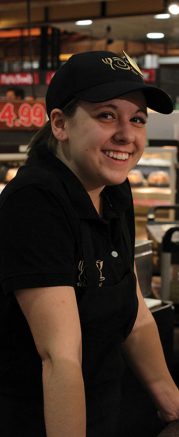



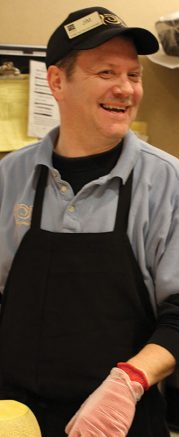

Wegmans merchants have embraced sustainability to the point their recommendations are encouraged and acted upon by Green Teams in each division.
Part of the issue we found with merchandising was that people were moving the displays around but were not readjusting the spotlights. In turn, people were putting up more lights complaining the displays were too dark when the problem was that the lights werent focused properly, Auria explains.
Fortunately, technology is advancing and opening up creative solutions, according to Rich Kelley, manager of engineering. Basically there are certain colors that make our product pop and certain colors that dont. At the end of the day were merchants and we need to choose lighting fixtures that highlight product better but also are more sustainable and cost effective.
According to Auria, You couldnt have put LED in produce departments five years ago. The problem with them was the color rendering wasnt as good, so you wouldnt have gotten the greens and reds and yellows out of the produce that you can today. Now we can capture produce in its natural state and really enhance the look of the products. We waited until the LED gave us the light quality we were looking for, he says, adding, You dont always want to be the leader using the newest technology because theres a lot of things that dont always work well.
Auria acknowledges, LED is getting there; its not ideal, but were close enough now where we made the changeover in our produce department. LED is still evolving and we are evolving with it.
Store design features also factor in to overall lighting affects. For example, in the new stores, the ceiling is a lighter color so it actually reflects the light better, which means you need fewer fixtures. In contrast, the more sustainable concrete floors, while still high polish, do not reflect the light as well as the stores with vinyl tile.
Its a science and an art really, says Wadsworth, but Wegmans has been ahead of the game as far as lighting of the stores. Founder Bob Wegman was always big into lighting, and his son and CEO Danny Wegman took it to another level in the look and feel and the comfort of the customer experience, he says.
In addition to the sales floor, better quality backroom lighting solutions have benefited produce operations as well. The guy working in the backroom getting the produce off the truck can actually see the product in its natural state and say, This shouldnt make it out of the store tomorrow, so that was an unexpected benefit we stumbled upon, says Auria.
At the same time, just turning off unnecessary lights proved quite impactful. A test at one of our stores where we started turning off lights until our customers said it was too dark 490 light bulbs in all was estimated to save enough energy to power 23 homes for one year, says Wadsworth.
CHILL OUT
Reducing refrigerant leaks is critical for Wegmans because of its focus on perishable foods and the need for extensive refrigeration in its stores. Produce is very sensitive to temperature changes, and the cases are open, so its a really good place to test secondary refrigerant loop technology, says Duquette. Wegmans was awarded an EPA GreenChill gold certification for its progressive refrig-erant management system. GreenChill is an EPA partnership with food retailers to reduce refrigerant emissions and decrease their impact on the ozone layer and climate change. We are probably in the minority of supermarket chains that actually can say we keep track of all the refrigeration we use, says Duquette. Most stores are too large to track, but weve been monitoring stores since 2009, which is a big plus in figuring out how to reduce leaks and also to design systems to use less refrigeration.
Its difficult if not impossible for a refrigeration system not to leak in its first year, and the older the system the more likely it leaks, and there are two distinct negative aspects; one, it costs money because refrigerant is very expensive, and two, we all know leaking refrigerant into the atmosphere is not good; its a greenhouse gas and can cause ozone depletion, says Kelley.
The changes weve made in secondary temperature refrigeration not only help reduce refrigerant charge, but Wegmans feels better about its food quality. Were not shocking the food. Weve heard from our merchants that product stays at a more even temperature now, Kelley says. We were recognized by EPA for reducing our refrigerant charge by approximately 50 percent on our low temperature system, says Kelley.
According to Duquette, refrigeration systems are tricky in talking carbon footprint because of all the variables involved, but moving forward, she says, We will be able to reduce refrigerant needs by over 80 percent for low temperature systems.
Once the foundation is in place, the people piece of the equation is next, training and education and basic things that employees can do to reduce energy use. Its about going back to the basics, how to use the equipment, and simplification of the process, says Wadsworth. One of the main elements is how do you sustain the energy systems that have been implemented, while continuing to innovate. Its a never ending process.
GRASSROOTS GUMPTION
One day, Jack DePeters, senior vice president of store operations, who also is known for his employee communication site, Ask Jack, received an intriguing question from a New Jersey store employee. What do we do with all the uniforms when they get a stain or a hole in them from all the wear and tear? Alas, Throw them in the trash wasnt a good answer. With 44,000 employees, thats a lot of uniforms, says Wadsworth, pointing out the magnitude of the problem.
We set out to find a better answer. We considered donating them, but there were some issues around donating a shirt that has our name on it. We werent comfortable with that. So we sought out a company that would shred uniforms and we found one here in New York that actually makes the insulation for carpeted interiors in automobiles.
We dont have all the answers here in Consumer Affairs, admits Wadsworth, adding, Often we find solutions through unlikely places. You never know until you start doing research and ask.
Suzanne Dunn, resource recovery coordinator, who has an unlikely passion for touring landfills and composting sites, says, I just cant stand to see anything being wasted that others could use, influenced by her child-hood upbringing and work in Haiti. When things we take for granted here, like running water, drinking from a faucet, and electricity, are scarce, you learn how to conserve and dont buy things you can live without. We reused everything and didnt throw things away.
Needless to say, Dunn is well suited for her position, where a big part of her job is developing and training the Green Teams in every store, standard procedures and best practices in regard to recycling, color-coding bins, making sure everybody has the tools they need, etc.
Weve always had some guidelines, but we had a lot of stores doing their own thing. Working with Jason, weve Wegmanized things to make the process more official and ensure everybody is on the same page, that all stores are using the same signage and consistent messaging, Dunn says, noting that some of the divisions have quarterly meetings, where all the Green Teams come together to exchange information. The primary reason Wegmans developed these guidelines, according to Wadsworth: How can there be accountability for recycling if not everybody knows what to do?
Customers can bring in their plastic bags, their cell phones and inkjet cartridges, batteries, bottles, cans, and any paper products to recycle. Last year customers brought back 775 tons of plastic bags, or 1.5 million pounds to help you visualize, says Wadsworth. Those all go to a central location reclamation center.
The produce department looks at shrink reports on a daily basis so managers know how to change their orders based on what people are buying and the trends. But they also get a monthly recycling report, so they know what their rate is for their store and can measure progress, according to Wadsworth, adding, Theres a little competition brewing between the stores.
As Wegmans continues to gr

